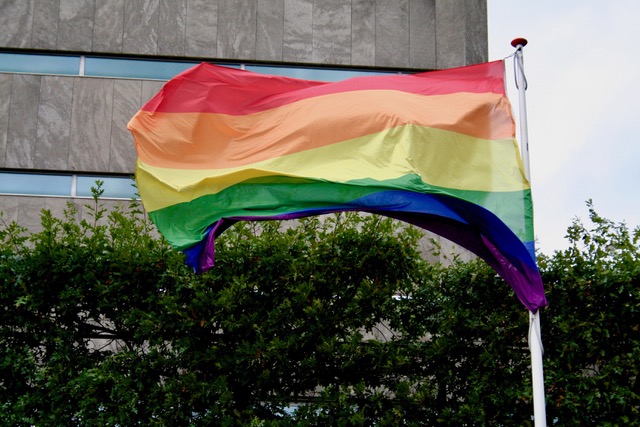Coming out day: ‘we can someday reach normality’
-
 Foto: Antonia Leise
Foto: Antonia Leise
Today is international Coming Out Day. LGBT student association Dito! stimulates students to proudly wave their rainbow flags and the university has also raised the multi-coloured flag all over campus. For some people, coming out is still an ongoing process. Vox writer Antonia speaks with her friend G., an international student at Radboud.
Antonia: ‘We are doing today’s interview without revealing your identity. Why do you want to remain anonymous?’
G.: ‘Because I have not outed myself as bi- or pansexual in front of some friends and I would rather do that in person instead of doing it in an interview.’
Antonia ‘So you mentioned being bi- or pansexual. How important are labels to you?’
‘I think it would be a very desirable future, in which we don’t have to ‘come out’ anymore’
G.: ‘For me, personally, not. But they make it easier to explain how I sexually identify, how I see myself – to others. It is easier for them to understand, when I say I am bisexual or pansexual. I am actually not quite sure whether I am one or the other, but I have a tendency to identify more as pansexual. But then, a lot of people do not know what that is, so I sometimes switch and tell them I am bisexual, because that is more known.’
Antonia: ‘For everyone who does not know: pansexuality is defined as an emotional or romantic attraction to people regardless of their gender or sexual identity.’
G.: ‘Exactly.’
Antonia: ‘When we talk about different sexualities, we also have to talk about representation. How important is representation in everyday life to you? For example, the visibility of people of different sexual orientations next to heterosexuality, like homosexuality, asexuality, pansexuality or bisexuality?’
G.: ‘Representation is actually very important to me. I think by having this representation and being open about the topic of sexual diversity, we give people, who still have to come out or are still questioning their own sexual identity, a secure basis.’
Antonia ‘Do you think that we can someday reach the point where coming out is not necessary anymore?’
G.: ‘I think it would be a very desirable future, in which we don’t have to ‘come out’ anymore, because heterosexuality is not assumed from the beginning and people see other sexualities also as a natural possibility. But I also think, that, with coming out day, we can celebrate accepting our own identity and share it with others. We have come a long way to be able to do that.’
Antonia: ‘That brings me to the very real present, because today, we are celebrating international coming out day. But there are still many countries, in which non-heterosexual intercourse is forbidden.’
G.: ‘In my opinion, there is nothing worse than not being able to be yourself — in your sexuality, but also in other aspects of one’s identity. And I think it is horrible, that love is still outlawed this way. Also, that some religions still stand behind the believe that love can only go in one direction.’

Antonia: ‘Have you ever experienced a conflict with yourself or your surroundings because of your sexual identity? How was your coming out?’
G.: ‘My own sexual identity became a topic quite late in life for me, but then it became something I thought very intensively about. Figuring out my own sexuality was, especially in the beginning, very hard for me. Not because it would not have been accepted, but because I was really unsure about it. And being non-heterosexual is still something unusual where I come from and I was not comfortable standing in the spotlight like that. That changed when I moved to Nijmegen and started university.’
Antonia: ‘And what changed exactly?’
G.: ‘I was put into an environment, where being non-heterosexual was nothing strange or uncommon anymore. I also met people who struggled with their sexual identity like I did. And, of course, I found a wide representation via the internet. That also helped.’
Antonia: ‘Talking about the internet — how important is the media in presentation and representation of different sexualities?’
G.: ‘I think the media plays a very important role. And I think that representation on TV is sometimes still lacking. When homosexuality is portrayed there, it is often the main characteristic of the character, instead of being handled as something normal. The internet, on the other hand, has a way bigger active community and that adds more layers to representation. And the experiences that are shared there can be really helpful in accepting and coming out yourself.’
Antonia: ‘That actually draws the line back to one of the earlier points we had about a desirable future in which sexual diversity is something normal.’
G.: ‘Yes, that would be something desirable. But on the other hand, I think we are also in need to lay an emphasis on sexual diversity and its representation. Because by doing so now, we can someday reach normality.’
Antonia: ‘So, in summary, we need to focus, right now, on sexuality and its representation, to someday have the luxury of not having to do so anymore?’
G.: ‘Exactly.’



